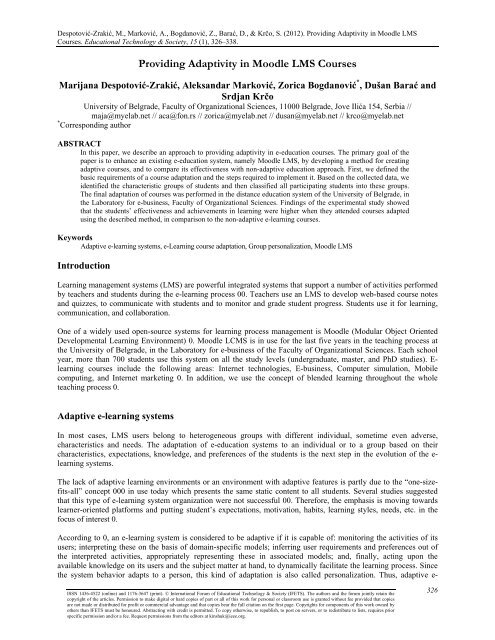January 2012 Volume 15 Number 1 - Educational Technology ...
January 2012 Volume 15 Number 1 - Educational Technology ...
January 2012 Volume 15 Number 1 - Educational Technology ...
Create successful ePaper yourself
Turn your PDF publications into a flip-book with our unique Google optimized e-Paper software.
Despotović-Zrakić, M., Marković, A., Bogdanović, Z., Barać, D., & Krčo, S. (<strong>2012</strong>). Providing Adaptivity in Moodle LMS<br />
Courses. <strong>Educational</strong> <strong>Technology</strong> & Society, <strong>15</strong> (1), 326–338.<br />
Providing Adaptivity in Moodle LMS Courses<br />
Marijana Despotović-Zrakić, Aleksandar Marković, Zorica Bogdanović * , Dušan Barać and<br />
Srdjan Krčo<br />
University of Belgrade, Faculty of Organizational Sciences, 11000 Belgrade, Jove Ilića <strong>15</strong>4, Serbia //<br />
maja@myelab.net // aca@fon.rs // zorica@myelab.net // dusan@myelab.net // krco@myelab.net<br />
* Corresponding author<br />
ABSTRACT<br />
In this paper, we describe an approach to providing adaptivity in e-education courses. The primary goal of the<br />
paper is to enhance an existing e-education system, namely Moodle LMS, by developing a method for creating<br />
adaptive courses, and to compare its effectiveness with non-adaptive education approach. First, we defined the<br />
basic requirements of a course adaptation and the steps required to implement it. Based on the collected data, we<br />
identified the characteristic groups of students and then classified all participating students into these groups.<br />
The final adaptation of courses was performed in the distance education system of the University of Belgrade, in<br />
the Laboratory for e-business, Faculty of Organizational Sciences. Findings of the experimental study showed<br />
that the students’ effectiveness and achievements in learning were higher when they attended courses adapted<br />
using the described method, in comparison to the non-adaptive e-learning courses.<br />
Keywords<br />
Adaptive e-learning systems, e-Learning course adaptation, Group personalization, Moodle LMS<br />
Introduction<br />
Learning management systems (LMS) are powerful integrated systems that support a number of activities performed<br />
by teachers and students during the e-learning process 00. Teachers use an LMS to develop web-based course notes<br />
and quizzes, to communicate with students and to monitor and grade student progress. Students use it for learning,<br />
communication, and collaboration.<br />
One of a widely used open-source systems for learning process management is Moodle (Modular Object Oriented<br />
Developmental Learning Environment) 0. Moodle LCMS is in use for the last five years in the teaching process at<br />
the University of Belgrade, in the Laboratory for e-business of the Faculty of Organizational Sciences. Each school<br />
year, more than 700 students use this system on all the study levels (undergraduate, master, and PhD studies). Elearning<br />
courses include the following areas: Internet technologies, E-business, Computer simulation, Mobile<br />
computing, and Internet marketing 0. In addition, we use the concept of blended learning throughout the whole<br />
teaching process 0.<br />
Adaptive e-learning systems<br />
In most cases, LMS users belong to heterogeneous groups with different individual, sometime even adverse,<br />
characteristics and needs. The adaptation of e-education systems to an individual or to a group based on their<br />
characteristics, expectations, knowledge, and preferences of the students is the next step in the evolution of the elearning<br />
systems.<br />
The lack of adaptive learning environments or an environment with adaptive features is partly due to the “one-sizefits-all”<br />
concept 000 in use today which presents the same static content to all students. Several studies suggested<br />
that this type of e-learning system organization were not successful 00. Therefore, the emphasis is moving towards<br />
learner-oriented platforms and putting student’s expectations, motivation, habits, learning styles, needs, etc. in the<br />
focus of interest 0.<br />
According to 0, an e-learning system is considered to be adaptive if it is capable of: monitoring the activities of its<br />
users; interpreting these on the basis of domain-specific models; inferring user requirements and preferences out of<br />
the interpreted activities, appropriately representing these in associated models; and, finally, acting upon the<br />
available knowledge on its users and the subject matter at hand, to dynamically facilitate the learning process. Since<br />
the system behavior adapts to a person, this kind of adaptation is also called personalization. Thus, adaptive e-<br />
ISSN 1436-4522 (online) and 1176-3647 (print). © International Forum of <strong>Educational</strong> <strong>Technology</strong> & Society (IFETS). The authors and the forum jointly retain the<br />
copyright of the articles. Permission to make digital or hard copies of part or all of this work for personal or classroom use is granted without fee provided that copies<br />
are not made or distributed for profit or commercial advantage and that copies bear the full citation on the first page. Copyrights for components of this work owned by<br />
others than IFETS must be honoured. Abstracting with credit is permitted. To copy otherwise, to republish, to post on servers, or to redistribute to lists, requires prior<br />
specific permission and/or a fee. Request permissions from the editors at kinshuk@ieee.org.<br />
326

















